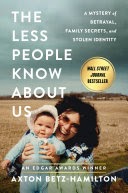Written By: Valerie Richards AFC®
In her memoir The Less People Know About Us: A Mystery of Betrayal, Family Secrets, and Stolen Identity, Axton Betz-Hamilton offers an intimate look into her life growing up in a small Indiana town in the nineties while grappling with the financial and emotional impacts of identity theft committed against her and her family. Betz-Hamilton’s identity was stolen at the young age of eleven. She would spend the next twenty years dealing with the impacts of this identity theft, ultimately finding the perpetrator and gaining a sense of control through education and research.

The book hooks readers immediately from the prologue, where a young Axton Betz-Hamilton arrives home from a long day of college classes to a thick envelope containing her credit report revealing a 380–credit score. She wrote in the book, “For a merciful second, I thought maybe that was good. After all, 100 is perfect.” This statement is a reminder of the lack of understanding most individuals have regarding their credit report. She quickly begins to understand 380 is not a good score; and learns she has several fraudulent charges on her report which began when she was only eleven years old.
What makes this book a must-read is its powerful firsthand account of the real-life impact identity theft can have on both an individual and their family. Betz-Hamilton shares her difficulties in trying to clear her name and the lack of support from agencies who she felt were supposed to be there to help her. Identity theft creates mistrust of others outside the home; to include close friends and family . . . everyone is a suspect. The mystery surrounding the perpetrator’s identity and the complex feelings that surface when their identity is finally discovered adds a gripping twist making this a true page turner. Betz-Hamilton weaves in stories from her upbringing that share the complexities in the relationship between a mother and daughter, and the trials of growing up and feeling like an outsider at school, all of which are intensified by the weight of identity theft. The impact of identity theft on the family is so large it almost feels like a character itself.
Determined to understand the financial crime that impacted her entire life, Betz-Hamilton reclaimed control of her situation by becoming a subject matter expert. Betz-Hamilton earned her PhD focusing her research on child identity theft and won awards for her research and outreach activities. Betz-Hamilton shares the inner conflict that came with feeling empowered by her research and helping others face the same situation, while also facing that this crime committed against her had become her world. Everything she thought she knew changed forever when she discovered the answer she had been desperately seeking:, the identity of the person who had done this to her.
As technology has advanced, so has identity theft, becoming more widespread and complex. Betz-Hamilton’s memoir masterfully explores the complexities of identity theft through her personal experiences. Betz-Hamilton shares her family photos throughout the book bringing the story to life. As a financial counselor, I found this memoir invaluable to gain deep insights into the impacts of identity theft, which in turn will help me as a counselor when helping individuals affected by identity theft. I recommend this book to anyone interested in the human story behind identity theft.